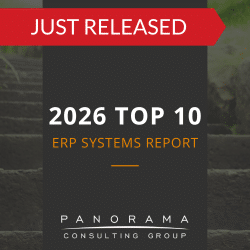Enterprise resource planning (ERP) systems are essential tools for modern organizations striving to increase operational efficiency, enhance data visibility, and support strategic decision-making. However, the implementation of these systems is complex, requiring significant time, resources, and careful planning.
According to our 2025 ERP Report, many ERP projects exceed their budgets and run behind schedule. This is often because organizations set unrealistic and accelerated timelines.
When companies rush the implementation process—whether due to cost concerns, pressure to stay competitive, or unrealistic timelines—the result is often far from satisfactory. Translation: Costly operational disruptions and decreased return on investment.
Today, we’re exploring the problems with accelerated ERP rollouts and their impact on the organization. We’ll also outline strategic recommendations for ensuring successful ERP deployments that align with your business needs so you can avoid the pitfalls of rapid implementations.
Consequences of Rushed ERP Implementations
When an ERP deployment is excessively accelerated, the ramifications are felt across the organization. Below, we analyze the challenges of rapid ERP adoption, highlighting common issues that arise from cutting corners.
1. Incomplete Requirements Gathering and System Misalignment
One of the primary risks of a rushed ERP deployment is inadequate requirements gathering. Skipping or abbreviating this step means that a system is often selected and deployed without a thorough understanding of business needs.
The consequence is a system that does not fully support key business functions.
As a result, employees may end up reverting to old processes or developing workarounds, undermining the entire investment.
Moreover, when the system cannot support strategic initiatives—such as enhancing customer service or improving financial reporting—the ERP’s potential benefits are never realized, leading to frustration at all levels of the organization.
These issues often require costly rework and post-implementation customizations, further inflating costs and delaying expected outcomes.
A Failed Payroll System Implementation
Panorama’s Expert Witness team was retained to provide a forensic analysis and written report to the court regarding the failed implementation of a major software developer’s ERP/payroll system.
2. Poor Data Migration and Quality Issues
In a rushed ERP deployment, data migration often becomes a casualty of tight schedules. Insufficient time is allocated for data cleansing, mapping, and validation, leading to critical data being incomplete, inconsistent, or incorrectly formatted in the new system.
As data integrity is crucial for accurate reporting and decision-making, poor-quality data in the ERP can have far-reaching effects.
Operational disruptions are a common result of data errors, impacting everything from order management to supply chain operations. For organizations in regulated industries, compliance issues may arise if inaccurate data jeopardizes audit trails or reporting standards.
Addressing these data problems post-go-live can be resource-intensive and disruptive, as it often involves revisiting configurations and workflows that were hastily implemented.
3. Lack of Employee Training and Low User Adoption
A new ERP system represents a substantial change for employees, impacting how they perform everyday tasks. Neglecting training puts organizations in a precarious position: Users will struggle to adapt, resulting in low adoption rates and poor utilization of the system’s capabilities.
This leads to increased error rates, frustration, and diminished productivity, which can negate the anticipated benefits of the ERP system. As employees grapple with unfamiliar processes, morale may suffer, contributing to resistance and even increased turnover.
In some cases, poorly trained staff may create compliance risks if critical processes, such as financial entries or quality controls, are executed incorrectly.
4. Insufficient Testing and Post-Go-Live Instability
Testing is a critical stage of any ERP implementation, ensuring that the system performs reliably and securely across different scenarios. However, when projects are accelerated, testing is often shortened or inadequately conducted.
This can result in system instability, functional errors, and security vulnerabilities. Ultimately, the impact could be operational downtime, delayed orders, and frustrated customers.
5. Organizational Resistance
The accelerated adoption of a new ERP system often neglects the “people” side of change. Employees are expected to quickly adapt to a new way of working, often with little understanding of why the change is happening or how it benefits them.
This lack of information leads to organizational resistance. Employees may fail to adopt new workflows or find ways to bypass the system. Over time, this slows the project momentum and delays the realization of expected benefits.
Strategic Recommendations for Successful ERP Implementations
Don’t rush. That much is clear. But what other best practices should you follow to ensure a successful ERP deployment?
Here’s what our business software consultants recommend:
1. Adopt a Phased Implementation Approach
Rather than pushing for a “big bang” implementation, many organizations opt for a phased approach that rolls out key functionalities incrementally.
Starting with core modules—such as financials and procurement—allows for focused testing and refinement before scaling up to more complex areas. This method reduces the risk of widespread disruptions and provides a manageable learning curve for employees.
A phased rollout also facilitates early value realization, as critical processes can begin benefiting from the ERP system while other functionalities are still under development. This approach helps maintain project momentum and allows for iterative improvements based on real-world feedback.
2. Invest in Comprehensive Training and Change Management
Training and change management are often the first areas to be cut in an accelerated project, but this is a critical mistake.
We recommend developing a comprehensive change management plan that starts early in the project lifecycle. This should encompass clear communication about the reasons for change and its benefits on an individual level.
When it comes to training, it should be role-specific, focusing on how the system affects daily tasks. Include practical exercises that replicate real-world scenarios, and offer ongoing support through a mix of workshops, tutorials, and peer mentoring.
Additionally, you may want to appoint change sponsors across departments to advocate for the system, provide guidance, and address concerns.
3. Dedicate Ample Time to Data Preparation and Migration
Effective data migration is the backbone of a successful ERP system.
Conduct a thorough audit of existing data well before implementation, identifying inconsistencies, duplicates, and obsolete information.
Then, create a detailed migration plan that outlines each step—from data extraction and cleansing to testing and validation.
For complex environments, consider running the new ERP alongside the legacy system for a period of time. This parallel run allows for real-time validation and reduces the risk of critical data discrepancies.
Post-implementation, we recommend enforcing strict data governance policies to maintain data quality and accuracy.
4. Allocate Sufficient Time for Testing and Quality Assurance
Testing should never be rushed.
Allocate time for multiple testing phases, starting with unit tests, followed by system integration tests, and finally, user acceptance testing (UAT). Each stage should simulate real business processes, ensuring that workflows function as expected and integrations are seamless.
Also, you should prioritize performance and security testing to identify bottlenecks and vulnerabilities before go-live.
5. Engage Independent ERP Consultants for Oversight and Guidance
Given the complexity of ERP implementations, it’s beneficial to engage independent ERP consultants.
Look for experts who have worked alongside computer software expert witnesses in ERP failure cases. These experts can provide objective oversight, identify potential risks early on, and offer solutions that align with your business needs.
This level of expertise is particularly valuable when an objective third-party assessment is required for project recovery or post-implementation evaluations.
The Key to Successful ERP Implementations
While the temptation to push for rapid ERP adoption may be strong, taking the time to get it right will pay dividends in the form of a stable, well-aligned ERP system that drives business value.
Request an ERP consultation to learn more about the problems with accelerated ERP rollouts, and how our team can help.















